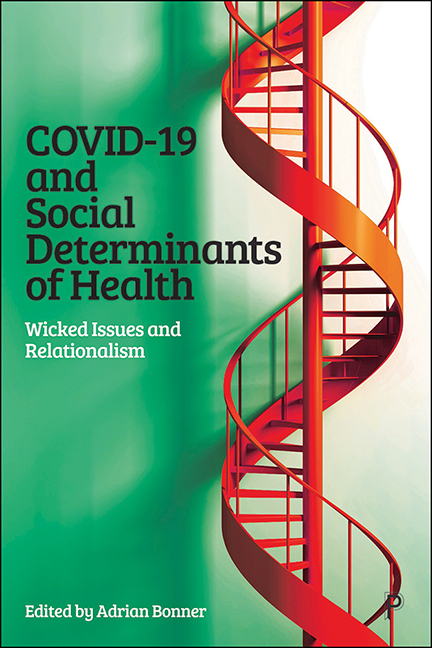Book contents
- Frontmatter
- Miscellaneous Frontmatter
- Contents
- List of figures and tables
- Notes on contributors
- Foreword
- Introduction
- Part I Wicked issues and relationalism
- Part II Regionalism and geopolitical environments
- Part III Public sector, COVID-19 and culture change
- Part IV The third sector
- Part V The case for relationalism
- Part VI Engagement and proposed changes
- Conclusion
- Appendix The Centre for Partnering
- Index
7.2 - Case study: Safe at home? Exploring intersecting vulnerabilities under COVID-19 and the role of faith actors in the South African context
Published online by Cambridge University Press: 18 January 2024
- Frontmatter
- Miscellaneous Frontmatter
- Contents
- List of figures and tables
- Notes on contributors
- Foreword
- Introduction
- Part I Wicked issues and relationalism
- Part II Regionalism and geopolitical environments
- Part III Public sector, COVID-19 and culture change
- Part IV The third sector
- Part V The case for relationalism
- Part VI Engagement and proposed changes
- Conclusion
- Appendix The Centre for Partnering
- Index
Summary
Introduction
In the early stages of the COVID-19 pandemic, South Africa recorded the fifth largest number of COVID-19 infections globally. By March 2021, it had over 1.5 million cases recorded with an estimated 50,000 COVID-19-related deaths (Reuters, 2020). Yet at the same time, it received early commendation from the WHO for its swift response (Ryan, 2020). An integral part of this was an early, strict national lockdown from March 2020 declared by President Ramaphosa (Relief Web, 2020). This helped flatten the curve and enabled health systems to prepare. A unique, but contested, aspect of South Africa’s lockdown was a total ban on the sale of alcohol over three periods,1 strongly influenced by third sector voices, in order to mitigate lockdown’s impact on women and children (Harrison, 2020).
Globally COVID-19 is seen to be escalating pre-existing, intersecting inequalities especially between rich and poor and between genders (Peterman and O’Donnell, 2020). South Africa remains highly unequal with a structural legacy of colonialism and apartheid. Public health and education systems are fragile, and thousands of families remain food insecure (May et al, 2020). COVID-19 has further entrenched inequalities with women and children bearing the brunt of increased household stresses and lockdown (Dartnell and Gevers, 2020). South Africa also has a toxic relationship with alcohol, partly shaped by its socio-structural history. Heavy drinking patterns by some have serious social costs (Matzopoulos et al, 2014; Trangenstein et al, 2018). This reality and its impact on violence against women and children (VAW/C) has drawn increased policy attention under COVID-19.
South Africa also has some of the highest rates of gender-based violence and femicide in the world (WHO, 2018). President Ramaphosa has focused on this issue with a 2018 presidential summit, a 2019 inter-ministerial task team and a National Plan of Action focused on violence against women and children (National Strategic Plan on Gender-based Violence and Femicide, 2020). However, a significant gap remains between legal and policy provisions and lived realities. COVID-19 and VAW/C are wicked issues characterised by social complexity, multiple actors and disagreement on how to respond appropriately.
- Type
- Chapter
- Information
- COVID-19 and Social Determinants of HealthWicked Issues and Relationalism, pp. 125 - 132Publisher: Bristol University PressPrint publication year: 2023

